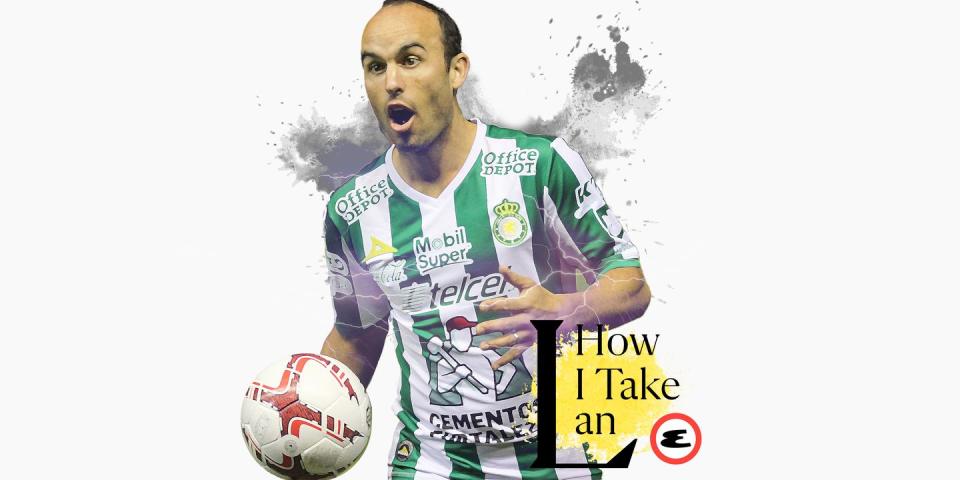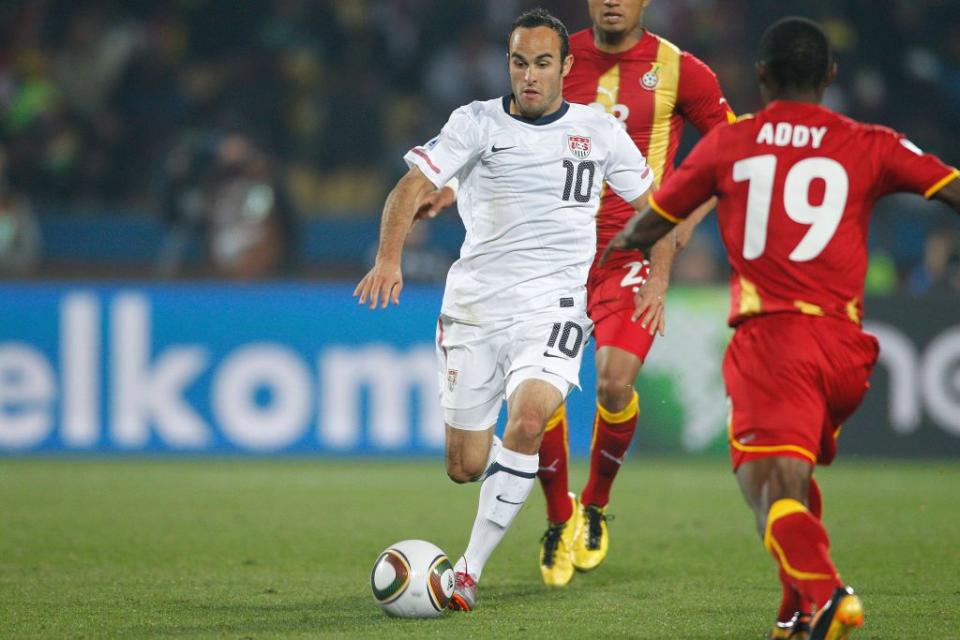How I Take an L: Landon Donovan

Ever wonder what your favorite athlete does when they just aren't playing very well? Do they watch a Will Ferrell comedy? Play Mario Kart with their kids? Suffer a fit of deep, existential angst? We wanted to know, too. Welcome to How I Take an L.
For our second edition, we talked to legendary American soccer player Landon Donovan, a man you'll be hearing a lot from in the coming weeks. (Read our inaugural column, with Austin Ekeler, right here.) The former LA Galaxy standout is making his debut with FOX Sports this month as a match analyst for the World Cup. Seeing as Donovan knows a thing or two about donning the red-white-and-blue during the tournament—including a certain holy-shit-did-that-just-happen goal versus Algeria—we called him up to see what it feels like to experience a defeat at the biggest pitch on the planet... and what the failure would look like for the American men.
ESQUIRE: Landon, how are you?
LANDON DONOVAN: Doing well—I leave in five days for the World Cup, so I'm excited.
Some part of you has to feel a sense of relief of going as just a commentator, right? Or are you heavily invested no matter what?
Well, I do, but it's much different than when you're playing. I'm going analytically, so I'm watching the games that we're doing. But two, I just want to be a fan. I mean, I really want to just go and find the American Outlaws Bar and hang out with the fans. And in my life, the last World Cup I went to that I wasn't participating in was 1994. I was 12 years old.
What would a poor performance from the American men in this World Cup look like? What’s the metric of success here?
My opinion is that we are still at a place in our country where the metric of success is whether we advance out of the group stage or not. There are probably five to 10 countries that feel like getting out of the group is not enough. But for us, I don't think that is the goal. So if we are able to accomplish that, I would say it's a success as a starting point. Not getting out of the group, I would say, has to be deemed a failure from a results perspective.
Are there any pressures on this group of American men that feels totally new to you?
It's hard to know. I mean, it's been eight years, but this is the first World Cup our players will go to with this level of social media exposure. I know in 2014, social media was still relevant and prevalent—but now it's just insane. So that, coupled with the amount of people who are going to be watching, which will be more than ever. But I always say: pressure is just perceived, right?
It’s interesting you say that—it didn't even occur to me that your era of teams probably weren’t dealing with any ragging on social media.
Not at all. In fact, in 2010 when we scored at the end of our last game to advance, there was what I would say was, at that time, a lot of media around it. But it's not like we were on our phones getting thousands of tweets and posts and messages and likes. It wasn't prevalent in that way yet. So this will be the first one in eight years. You can imagine what that's going to look like.
I was going to ask you about that goal against Algeria. Can you just simply describe the emotions of going from one of the greatest moments in U.S. soccer history to a loss right after that?
Yeah, I mean, that was the challenge—we played three days later. This is why when people ask, “Can a team like the U.S. win a World Cup right now?” The challenge is not: are we good enough to compete with any of the best teams? We definitely are. It’s: can you do it seven times in a row over the course of a month? That's the hard part. So for us, there's such an emotional uplifting after that game. But then as quickly as possible—while still wanting to celebrate it—you have to come back down and get ready for the next game. That just proved too much, I think, physically and emotionally for us.
Is there anything specific you can do for that fifth, sixth, or seventh game to get yourself up? Especially if you’re the one not playing well.
Well, the beauty of our sport is that it's a team sport. I had many, many days where I did not play well, but we won. The hard part is when you don't play well and you lose. That's when you feel, certainly in my case, a sense of responsibility. That's hard to deal with. But during a bad performance, as I got older, I had awareness to know that it probably wasn't going to be my best day with the ball. So what can you do that has a positive impact on the game? When you're on the field, can you literally just do more running to help your team? Can you defend well? Can you press the ball well? Good places to focus your energy. Then generally speaking, when you do those things well, you start to play better too.
You were pretty outspoken about mental health issues long before it was common to talk about it in sports. When you were at your lowest, how did you take care of yourself and get yourself out of those places?
Not by myself. My family and therapist were the main ones. Support from people who love me and care about me. It is extremely difficult to get yourself out of severe depression, severe anxiety. It's very, very difficult. So I was fortunate that I was willing to accept help. I think a lot of people understandably see that as weakness to ask for help. I was willing to ask for help. I was willing to be vulnerable. And that led me to healing.
For me, it’s just been as simple as getting myself an hour with a therapist every week. Even getting that time, I think, helps you get out of it after a while.
For sure. And I don't think there's harm for any human being in speaking to another human being about your challenges. What I have learned is the more you talk about things, the smaller they become. So in your mind it's this huge deal and it's this and that, but the more you talk about it, the less potent it becomes. And so the biggest thing that talking to someone does is to bring self-awareness. The more you talk about yourself and your problems, the more you realize why you do things, how your brain is processing something, why something bothers you. Then when it happens in the future, you can see it very quickly without judgment.

I want to ask about the point in your career when you went from Germany to Everton. Can you take me through going from not being your total superstar self in Germany to dusting yourself off and really having that international success at Everton?
Part of it is the timing of where I was in my career. I was in Germany when I was young—I just wasn't good enough yet. I thought I was, I wanted to be, but I just wasn't good enough. So that was part of it. But there's a phrase I used with my team in San Diego that my assistant coach uses a lot. It's: the right player, the right place, the right club, with the right coach, at the right time. So when all those factors come together, well, you can get elite performance. And that came together perfectly when I was in England. It was the right club for me, at the right time in my career, with the right coach, and I was the right player to be in that situation. It all came together perfectly.
It's funny—I feel like, broadly, you could say that about a lot of jobs.
That's right.
It’s hard to remember in the moment that there are a thousand things that contribute to someone's individual success.
Yeah. Or failure, right?
Right.
And that doesn't mean it was bad, or wrong, or you shouldn't have tried. Sometimes it doesn't work or the timing's not right.
I'm referencing you not being chosen for the 2014 World Cup team with what I’m about to ask, but I want to do it in broad terms. I think the feeling of not being picked for something is something that all of us go through, whether it’s grade school basketball, not being chosen for a job as an adult, or even in relationships. How do you bounce back from not feeling like you're wanted for something?
In this case, for me, I was so fortunate that I had a Galaxy game five days later, right? I was able to go back to a situation where I knew I was loved, appreciated, and respected. My teammates were like family to me. I was with them five or six hours a day for multiple years on end. And I was able to go just step on the field and play and work through it that way. It doesn't mean that I was going home and celebrating every night and I was happy. It was still very challenging off the field. But I did have a way to cope with it immediately. Which gave me confidence—which sounds crazy at that age—but confidence that I was still a good player and I could still perform at a high level, because your confidence gets shaken when you're not chosen for something.
I don't know if this is oversimplifying, but I think there is truth to the Ted Lasso be-like-a-goldfish-thing.
Damn right there is. One thing I've learned more than anything through therapy, is that there's absolutely nothing you can do about what's happened except to learn from it. Even now, still looking back, I learned from it. But there's nothing you can do about it, right? Once you can process it and move on from it, the quicker you do that the better. And on the other end of that spectrum is just being present, right? So not focusing on the end of the season or the playoffs. I had the ability to just go and be really present and play a game that weekend. That really helped me heal.
You Might Also Like

